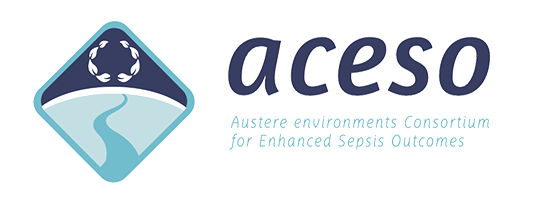Evidence-Based Clinical Management
ACESO’s efforts seek to provide a continuum in severe infections/sepsis management leading with translational biology bridging it to diagnostics and adaptive clinical care with global application to any resource-limited setting. ACESO’s efforts in strengthening clinical capabilities in resource-limited settings provides the platform to conduct regulated clinical trials for diagnostics and therapeutics. As part of this, ACESO is ensuring operational logistics in austere settings globally including training personnel, securing supply chain and mobile deployment, and maintaining compliant clinical data capture systems.
EPICC
The Epidemiology, Immunology, and Clinical Characteristics of Emerging Infectious Diseases with Pandemic Potential, or EPICC, study aims to identify risk factors for COVID-19 in the military population, understand the symptoms and disease course, and investigate clinical outcomes. The major goals of the EPICC study are to inform military health system (MHS) clinical care and practice guidelines to improve clinical care and management of those with COVID-19 and inform future disease prevention strategies.
Plague
ACESO has established a research and training platform for sepsis and severe infections in Madagascar with the aim of conducting regulated clinical trials for treatment and prevention of endemic pathogens including Plague. The ACESO team has worked with in-country partners to augment the local research, infection prevention and control, and microbiology lab capacity. The site was initiated with a prospective observational study of sepsis and acute febrile illness (AFI) which will characterize the spectrum and antimicrobial resistance patterns of pathogens causing sepsis and AFI. From this research platform, the focus will expand to develop regulated clinical trials for medical counter measures against plague.
Profusa
More information coming soon!
Prometheus 2.0
Prometheus 2.0 is a study that plans to identify early biomarkers of contagiousness that will allow identification of a case of acute respiratory infection (ARI) soon after exposure to an infectious agent and before the case transmits the infection. Such an identification would allow isolation and treatment to prevent onward transmission. We will directly identify cases of naturally occurring ARI, and will, by daily monitoring of their close contacts within the cohort and infectious agent shedding, and microbiome of ARI index and secondary cases, be able to identify cases with high and low probability of transmission.
PROTECT - Adaptive Platform Trial
The Prophylaxis and Treatment of COVID-19 – Adaptive Platform Trial (PROTECT-APT) aims to establish an adaptive platform trial to enable the evaluation of investigational products for prompt treatment and post-exposure prophylaxis of SARS-CoV-2 infection. Along with comprehensive clinical parameters, the above clinical trial will be collecting host gene-expression levels as well as host protein biomarker data during the progression of the COVID-19 disease. In addition to SARS-CoV-2 infections, the physiological responses and biomarkers associated with Influenza-like Illness (ILI) and acute respiratory infections will also be studied.
SCOPE
The Severe Acute Zoonotic Pathogen (SCOPE) protocol is designed to allow clinical investigation of severe acute respiratory infections with viral pathogens of concern to global public health. The protocol outlines a systematic approach to collection of clinical specimens and data by adapting standard procedures for conducting clinical characterizations of severe emerging infections as published by the International Severe Acute Respiratory and Emerging Infection Consortium (ISARIC) network (ISARIC/WHO Clinical Characterization Protocol for Severe Emerging Infections, version 3.1). The protocols are to accommodate a longitudinal observational study of emerging or re-emerging pathogens. Protocol modifications could describe methods for serial collection and clinical characterization of specimens and associated demographic, laboratory, clinical, and other data specific for pathogens of interest and associated study population(s).
Sepsis Observational
Founded in 2010, the Austere environments Consortium for Enhanced Sepsis Outcomes (ACESO) is a consortium consisting of U.S. Government, non-profit, academic and industry partners administered by the Henry M. Jackson Foundation for the Advancement of Military Medicine, Inc. ACESO’s mission is to improve survival for patients with sepsis through development of host-based diagnostic and prognostic assays and evidence-based clinical management. ACESO is specifically focused on developing solutions to guide clinical decision-making in settings where a modern intensive care unit (ICU) is not available, including military deployments to areas with long medical evacuation chains, medical centers in low- and middle-income countries, and pandemic or other public health emergency settings. To accomplish this mission, ACESO has established an international network of clinical research sites in five countries spanning three continents. We have enrolled approximately 1000 subjects in an observational study of patients with suspected sepsis, from hospitals in Cambodia, Ghana, Liberia, Uganda, and the US. Our clinical research platform was specifically designed for geographic, ethnic and etiologic diversity.
